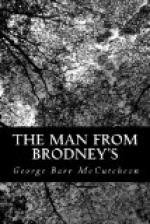“That little old trust fund is making more money for me by lying idle than I could accumulate in a century by hard work as a grocer or an undertaker,” he was prone to philosophise when his uncles, who were merchants, urged him to settle down and “do something.” Not that there were grocers or undertakers among them; it was his way of impressing his sense of freedom upon them.
He was an orphan and bounden to no man. No one had the right to question his actions after his twenty-first anniversary. It was fortunate for him that he was a level-headed as well as a wild-hearted chap, else he might have sunk to the perdition his worthy uncles prescribed for him. He went in for law at Yale, and then practised restlessly, vaguely for two years in Baltimore, under the patronage of his father’s oldest friend, a lawyer of distinction.
“If I fail at everything else, I’ll go back to the practice of law,” he said cheerfully. “Uncle Henry is mean enough to say that he has forgotten more law than I ever knew, but he has none the better of me. ’Gad, I am confident that I’ve forgotten more law, myself, than I ever knew.”
Tiring of the law books and reports in the old judge’s office, he suddenly abandoned his calling and set forth to see the world. Almost before his friends knew that he had left he was heard of in Turkestan. In course of time he served as a war correspondent for one of the great newspapers, acted as agent for great hemp dealers in the Philippines, carried a rifle with the Boers in South Africa, hunted wild beasts in Asia and in Hottentot land, took snapshots in St. Petersburg, and almost got to the North Pole with one of the expeditions. To do and be all of these he had to be a manly man. Not in a month’s journey would you meet a truer thoroughbred, a more agreeable chap, a more polished vagabond, than Hollingsworth Chase, first lieutenant in Dame Fortune’s army. Tall, good looking, rawboned, cheerful, gallant, he was the true comrade of those merry, reckless volunteers from all lands who find commissions in Fortune’s army and serve her faithfully. He had shared pot luck in odd parts of the world with English lords, German barons and French counts—all serving under the common flag. His heart had withstood the importunate batterings of many a love siege; the wounds had been pleasant ones and the recovery quick. He left no dead behind him.
He was nearly thirty when the diplomatic service began to appeal to him as a pleasing variation from the rigorous occupations he had followed heretofore. A British lordling put it into his head, away out in Delhi. It took root, and he hurried home to attend to its growth. One of his uncles was a congressman and another was in some way connected with railroads. He first sought the influence of the latter and then the recommendation of the former. In less than six weeks after his arrival in Washington he was off for the city of Thorberg in the Grand Duchy of Rapp-Thorberg, carrying with him an appointment as consul and supplied with the proper stamps and seal of office. His uncle compassionately informed him beforehand that his service in Thorberg would be brief and certainly would lead up to something much better.




